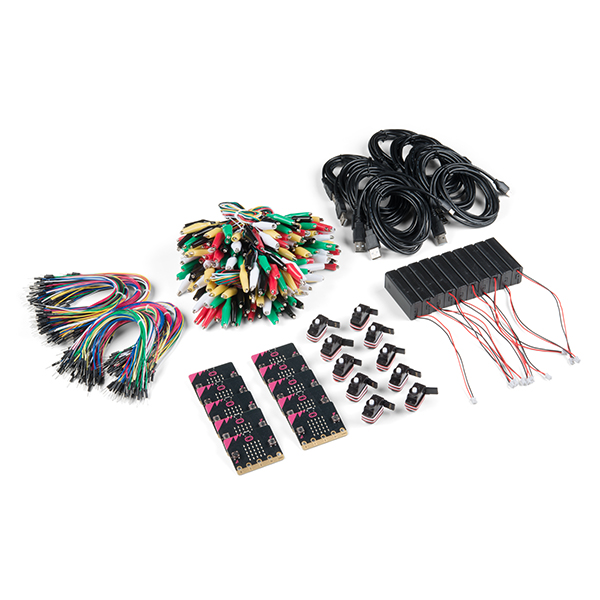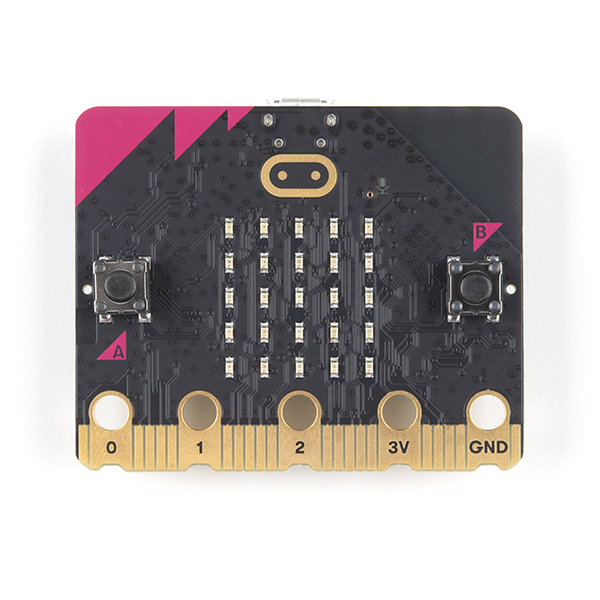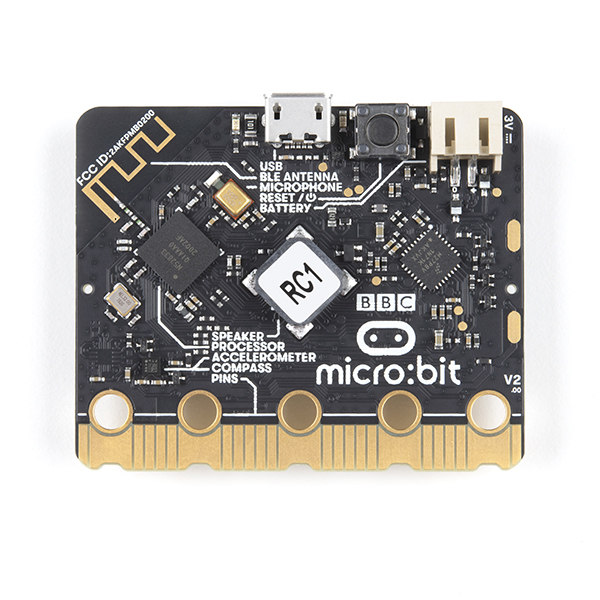×
SparkFun will be closed on Tuesday, December 24th, and Wednesday, December 25th, in observance of the Christmas holiday. Any orders qualifying for same day shipping placed after 2:00 p.m. (MST) on Monday, December 23rd, will be processed on Thursday, December 26th, when we return to regular business hours. Wishing you a safe and happy holiday from all of us at SparkFun!
Please note - we will not be available for Local Pick up orders from December 24th-December 27th. If you place an order for Local Pick-Up we will have those ready on Monday, December 30th.
The micro:bit v2 Educator's Lab Pack includes 10 micro:bit v2 boards and everything you need to get you started with the new learning platform. The Lab Pack has everything you need, including micro:bits, cables, battery packs and a few parts to experiment with. This package provides an easy way to introduce your students to the micro:bit without any difficulty or parts hunting.
SparkFun packages everything educators need to get started with the micro:bit in a variety of classroom settings and learning environments. The hardware boards, cables and extra parts come pre-packaged. Examples and curriculum materials are available from SparkFun and micro:bit, as well as from other educators involved in this growing maker education movement.
Lab Packs are your classroom entry point. By combining our kits, popular boards and other educational tools with support materials (to be updated), SparkFun brings all the power of the open source community to the classroom. We've also updated the battery pack to be closer to what is in other micro:bit kits. It now requires 2xAAA batteries.
The micro:bit is a pocket-sized computer that lets you get creative with digital technology. Between the micro:bit and our shield-like bit boards you can do almost anything while coding, customizing and controlling your micro:bit from almost anywhere! You can use your micro:bit for all sorts of unique creations, from robots to musical instruments and more. At half the size of a credit card, this versatile board has vast potential!
- 10x micro:bit v2 Board
- 10x micro:bit Battery Holder --- 2xAAA
- 10x USB Micro-B Cable --- 6 Foot
- 10x Jumper Wires Standard 7in. M/M --- 30 AWG (30 Pack)
- 10x Alligator Test Leads (10 Pack)
- 10x Small Servo
- NOTE AAA Batteries are NOT included
Micro:bit 2.0:
- 64 MHz Arm Cortex-M4 with FPU
- 512KB Flash
- 128KB RAM
- 5x5 Red LED Array
- Two Programmable Buttons, one touch sensitive logo
- MEMS microphone and LED indicator
- Onboard Light, Compass, Accelerometer, Temp Sensors and Speaker
- 2.4 Ghz Micro:bit Radio/BLE 5.0 Smart Antenna
- 25-pin Edge Connector
- 4 dedicated GPIO, PWM, i2c, SPI, and ext. power
- Three Digital/Analog Input/Output Rings
- Two Power Rings --- 3V and GND
- Dedcated I2C bus for peripherals
- MicroUSB Connector (5V)
- JST-PH Battery Connector (Not JST-XH) (3V)
- Power/reset Button with Status LED
- 200 mA available for accessories
- Program with C++, MakeCode, Python, Scratch
SparkFun Educator Lab Pack for micro:bit v2 Product Help and Resources
micro:bit Educator Lab Pack Experiment Guide
May 8, 2018
A quickstart guide for the micro:bit educator lab pack.
How to Load MicroPython on a Microcontroller Board
September 4, 2018
This tutorial will show you how to load the MicroPython interpreter onto a variety of development boards.
Core Skill: Robotics
This skill concerns mechanical and robotics knowledge. You may need to know how mechanical parts interact, how motors work, or how to use motor drivers and controllers.
Skill Level: Competent - You may need an understanding of servo motors and how to drive them. Additionally, you may need some fundamental understanding of motor controllers.
See all skill levels
Core Skill: Programming
If a board needs code or communicates somehow, you're going to need to know how to program or interface with it. The programming skill is all about communication and code.
Skill Level: Rookie - You will need a better fundamental understand of what code is, and how it works. You will be using beginner-level software and development tools like Arduino. You will be dealing directly with code, but numerous examples and libraries are available. Sensors or shields will communicate with serial or TTL.
See all skill levels
Core Skill: Electrical Prototyping
If it requires power, you need to know how much, what all the pins do, and how to hook it up. You may need to reference datasheets, schematics, and know the ins and outs of electronics.
Skill Level: Rookie - You may be required to know a bit more about the component, such as orientation, or how to hook it up, in addition to power requirements. You will need to understand polarized components.
See all skill levels
Comments
Looking for answers to technical questions?
We welcome your comments and suggestions below. However, if you are looking for solutions to technical questions please see our Technical Assistance page.
Customer Reviews
No reviews yet.



